#gender queer Davy
Explore tagged Tumblr posts
Note
How does Davy go about coming out about his gender in the glam au? 👀
Boy am I glad you asked! So first I wanna talk about how he realizes he’s genderqueer which all comes from Micky convincing him to do the Glam Rock fits for a show.
Davy does the sorta androgynous glam rock stuff, he gets his makeup done, and he assumes that everyone feels a little euphoric when they get their makeup done and put on nice clothes. He didn’t think anything of it until he talks about how he understands why girls will go out and pamper themselves because when he feels like such a pretty princess when he’s all dolled up. Micky and Mike sorta laugh off his phrasing at first assuming he was joking about enjoying feeling like a pretty princess but after making enough comments like that Mike decides to take him aside and ask him about what he really means by that. In that moment Davy realizes it’s not actually normal for guys to want to be a pretty princess and he sorta spirals for a bit having lived so much of his life under the assumption that EVERYONE felt like they had to choose to dress in their assigned gender and that everyone guy had to make a conscious effort to not act in traditionally feminine ways. He tried at first to assign this difference to his sexuality but eventually realizes it really is his gender that’s causing this feeling. Davy doesn’t come out in like a straight forward way, mostly because he isn’t confident that he’s actually right and not misidentifying whats going on, and instead just asks if they think it’d be a good look for the band if he started wearing more feminine costumes too. His friends sorta get what’s happening because they’ve seen and talked to Davy about his gender crisis a lot over the years but Davy credits his coming out as when he first preformed in a feminine costume and felt this insane build up of euphoria during the show and then backstage told Micky and Mike that he thinks he’ll keep doing this even off the stage (this being dressing feminine) and this results in Davy being accidental publicity because news in the late 70s is really curious as to why this guy is so casually wearing “girl clothes” out in public.
Davy’s public image when they started blowing up is that he’s one of those gender non conforming men in rock (like David Bowie style) and while the public doesn’t know about him being genderqueer they are very aware of him being a gender non conforming glam rocker. Mike and Micky are very supportive of his dressing however he wants even though they tend to save the glam stuff for the stage and during big public appearances (Davy is the only one of them that will occasionally wear makeup just out and about but usually only on days where he’s very feminine and/or feeling dysphoric about looking masculine.) Davy doesn’t really have a word to describe what his gender is but he does try to explain to Mike and Micky that it’s not just how he dresses it’s like how he is. Davys really open to Mike and Micky about his gender but always tries to act macho when he’s doing interviews and making appearances because he’s really nervous about what’ll happen if any of this gets out.
One of the first things Peter asks Davy about when they’re back on speaking terms is the way he dresses and Davy at first just snaps at him (because he still doesn’t really feel like he can trust Peter again yet) but the turning point of their relationship is represented by Davy coming out to Peter (who spent most of his time away from them on the queer scene in New York so he ends up understanding what Davy means a lot faster than Mike and Micky did)
8 notes
·
View notes
Text

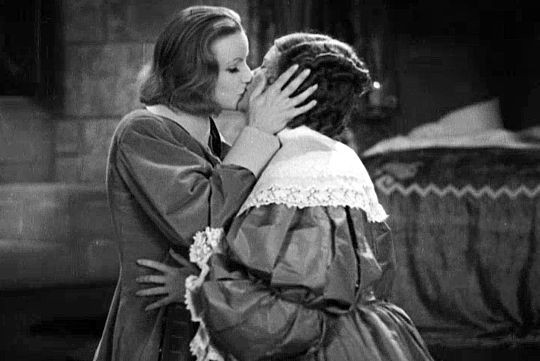

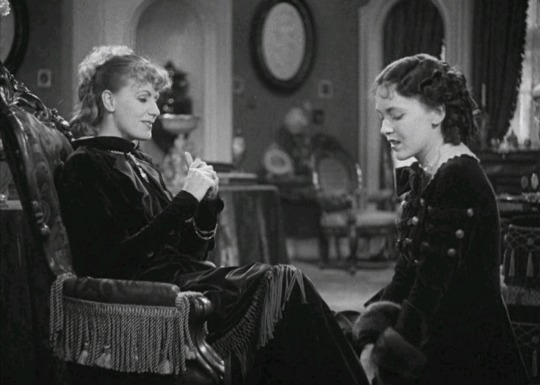
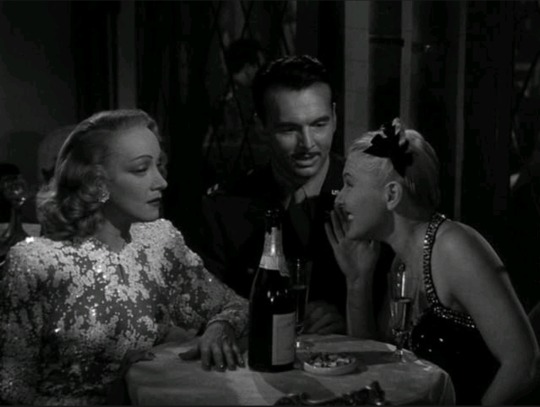
I already rewrote Queen Christina as a lesbian political drama in my head...and now I can't can't get the idea of a queer golden age of cinema out of my head.
#i want a queer golden age of Hollywood#we take all those movies they did back then and make them queer#i dont even need the movies to be good i just want to enjoy more movies with queer roles#just start remaking all the old films and gender/sexuality swap the characters#movies#lesbian#old hollywood#cinephile#greta garbo#anna karenina#queen christina#bette davis#all about eve#some like it hot#jack lemon#tony curtis#marilyn monroe#anne baxter#a foreign affair#marlene dietrich#jean arthur#maureen o'sullivan#elizabeth young#1930s movies#1940s movies#classic film#silver screen#golden age#queer#lgbtq
87 notes
·
View notes
Text
Beyond Trans: Does Gender Matter? by Heath Fogg Davis
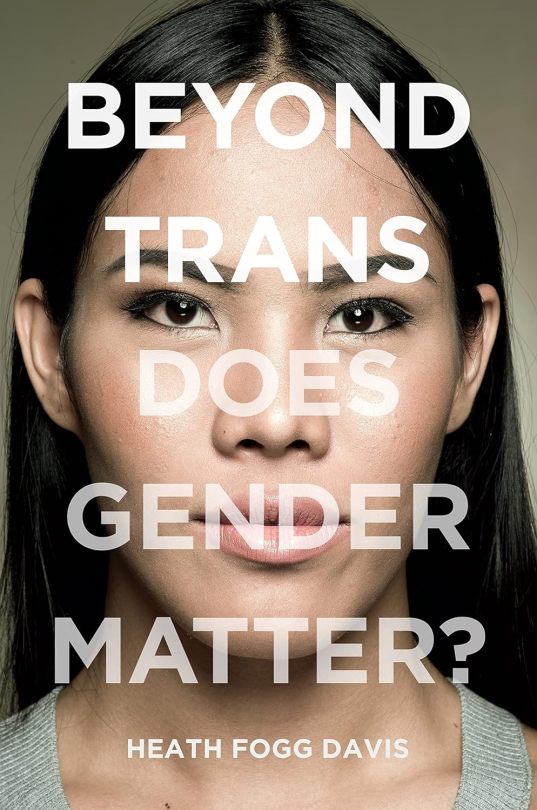
Goes beyond the category of transgender to question the need for gender classification
Beyond Trans pushes the conversation on gender identity to its limits: questioning the need for gender categories in the first place. Whether on birth certificates or college admissions applications or on bathroom doors, why do we need to mark people and places with sex categories? Do they serve a real purpose or are these places and forms just mechanisms of exclusion? Heath Fogg Davis offers an impassioned call to rethink the usefulness of dividing the world into not just Male and Female categories but even additional categories of Transgender and gender fluid. Davis, himself a transgender man, explores the underlying gender-enforcing policies and customs in American life that have led to transgender bathroom bills, college admissions controversies, and more, arguing that it is necessary for our society to take real steps to challenge the assumption that gender matters.
He examines four areas where we need to re-think our sex-classification systems: sex-marked identity documents such as birth certificates, driver’s licenses and passports; sex-segregated public restrooms; single-sex colleges; and sex-segregated sports. Speaking from his own experience and drawing upon major cases of sex discrimination in the news and in the courts, Davis presents a persuasive case for challenging how individuals are classified according to sex and offers concrete recommendations for alleviating sex identity discrimination and sex-based disadvantage.
For anyone in search of pragmatic ways to make our world more inclusive, Davis’ recommendations provide much-needed practical guidance about how to work through this complex issue. A provocative call to action, Beyond Trans pushes us to think how we can work to make America truly inclusive of all people.
#beyond trans: does gender matter?#heath fogg davis#trans book of the day#trans books#queer books#bookblr#booklr
12 notes
·
View notes
Text
something something, the gender euphoria of realizing I stand a full inch taller than Davy Jones i.e. the first guy I had the age old “be with him vs be him” mental debate about as a young queer boy, and post
#the Queer Experience#the universal monkees-centric gender envy experience we ALL had#even the cis#me as a six year old seething with jealousy and unnamed gender envy as I watched the 1966 comedy TV show The Monkees#the monkees#monkeeposting#davy jones
11 notes
·
View notes
Text

By: Lisa Selin Davis
Published: Apr 11, 2024
A long-awaited report out this week found that medical professionals in the UK who advocate for gender transition in children are misguided ideologues.
Written by British pediatrician Dr. Hilary Cass, The Cass Review, which is nearly 400 pages and took more than four years to compile, comes to the following conclusions:
Thousands of vulnerable young people were given life-altering treatments with “no good evidence on the long-term outcomes of interventions to manage gender-related distress.”
“It has been suggested that hormone treatment reduces the elevated risk of death by suicide in this population, but the evidence found did not support this conclusion.”
“Social justice” ideology is driving medical decision-making, and “the toxicity of the debate” has created an environment “where professionals are so afraid to openly discuss their views.”
Activists insist the science on this matter is settled, but Cass’s tone recalls a stern British nanny calmly explaining to unruly children how to get their room in order. She shows us that everything about this issue is unsettled, and unsettling. For instance, she notes that “social transition”—when very young children assume other gender identities—is an “active intervention” that may set youths on a path to medical transition. And it may even make gender dysphoria worse.
The review, commissioned by England’s National Health Service, comes after more than a decade of whistleblowing by clinicians at the country’s Gender Identity Development Services, or GIDS, which was established in 1989 (but mostly off the radar for its first 20 years, because few children and families sought its services).
These whistleblowers detailed how kids were fast-tracked to medication while a culture of fear grew around raising any concerns, even as demand for youth gender medicine exploded. Eventually, the NHS decommissioned GIDS and hired the neutral, no-nonsense Cass to detail what went wrong and what to do right moving forward.
Her report made the further damning conclusions:
Clinicians “are unable to reliably predict which children/young people will transition successfully and which might regret or detransition at a later date.”
A disproportionate number of patients were “birth registered females presenting in adolescence. . . . a different cohort from that looked at by earlier studies.”
Many parents feared their children had been medicalized by professionals who didn’t take other difficulties into account, “such as loss of a parent, traumatic illness, diagnosis of neurodiversity, and isolation or bullying in school.”
There is a lack of strong evidence to show that puberty blockers “may improve gender dysphoria or overall mental health.”
The majority of gender-dysphoric patients in early studies found that their symptoms desisted during puberty, with most coming out as gay or bisexual later.
Cass notes that “for most young people, a medical pathway will not be the best way to manage their gender-related distress.” She supports expanding the treatment to regional, holistic centers, essentially ending the specialist gender clinic model. That treatment should be based on unbiased psychological care, and robust and consistent evaluation tools must be developed so reliable evidence can finally be gathered.
This final report—and an interim one Cass issued in 2022—echoes what a number of Western nations, such as Finland and Sweden, have found when they reviewed their own youth gender services. It also underscores what we see in the United States: poor quality research, an unstudied population, and detransitioners traumatized by the treatment they received.
Today, red states are banning the medicalization of gender dysphoric youth, while some blue states have declared themselves medical sanctuaries for minors seeking transition. Medical associations—from the American Academy of Pediatrics to the American Psychological Association—continue to support the “affirmative” model criticized by Cass in her report.
In her review, Cass directly addresses the 9,000 young people who have moved through gender treatments via the NHS, stating bluntly: research “has let us all down, most importantly you.”
The U.S. needs to form a truly bipartisan commission that looks at the evidence regarding youth gender medicine. As things stand now, we will continue to be stuck in a perpetual culture war, with parents and distressed kids paying the price.
#Lisa Selin Davis#Cass review#Cass report#medical scandal#medical corruption#medical malpractice#gender affirming care#gender affirming healthcare#gender affirmation#detrans#detransition#Hilary Cass#Dr. Hilary Cass#gender ideology#gender identity ideology#queer theory#intersectional feminism#religion is a mental illness
14 notes
·
View notes
Text
Things HRT didn't do:
Make me mean
Impact my ability to cry
Ruin my singing
Make me ugly
Things HRT did do:
Make me into a short-stack Alan Davies
#hrt#testosterone#queer#transgender#alan davies#gender goals tbh#i've been watching a lot of QI recently lol
13 notes
·
View notes
Text
Queerness In Ninjago (Spoiler alert, it's very queer)
Contains spoilers
I honestly don't see the queer side of Ninjago being talked about enough. Probably because half of the fandom are immature homophobic people but that's not gonna stop me writing a whole post about it on Tumblr that probably no one is gonna see. I'm gonna be looking at specific characters and at the canon part of it. I do have my own headcanons and stuff but I'm gonna try to forget about those for the sake of this post.
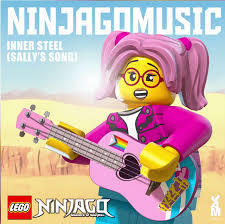
First, let's start out with a character who is almost 95% canon to be part of the LGBTQ+ community, Sally. She's a side character and doesn't play much of a role in the series after The Benefit of Grief but I feel like she's still worth mentioning. She has the progress pride flag on her guitar and the back of her dad's van which shows that she's definitely a supporter.

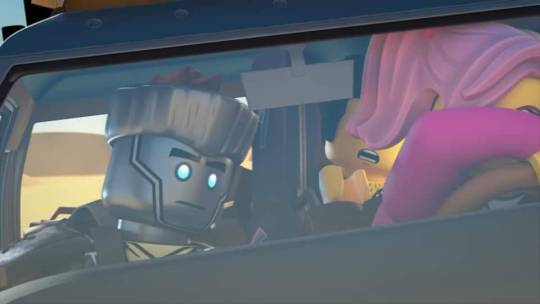
You can also see the bisexual flag on her guitar case, which tells us that she's bisexual! They don't do much about with it after this but it's still good to have some representation, even if it's not a big part of the story. This is probably the only instance where a character has had their sexual orientation shown in Ninjago.
The episode where we see her in the most, The Benefit of Grief, can be viewed as an allegory of coming out, which I touch more on here, but in case you're too lazy, I'll just explain how here. The basic premise of the episode is her running away from home because she wants to move to Ninjago City and get big in the music industry. However after a while she starts to feel guilty about it, but I'd afraid to go back in fear that her parents won't forgive her. With the help of Zane she makes the decision to go back home with her parents. Her parents forgive her and woo yay happy ending.
This episode can be taken as a coming out experience. Think about it. You hide your sexual orientation/gender identity from your family, friends, or others in your life. You feel guilty about it but also afraid to come out, out of fear that they won't accept you. It's a pretty good allegory. It most likely wasn't intentional but it will always be in my head because how can you write such a good allegory like that with a canon queer character as the main character and not calm it intentional? That's all that I have to say about Sally though.

Now let's get started with these 2 girlies. They competed in the Terra Technica Dance-Off in season 12, Prime Empire. They were heavily treated like a lesbian couple in the episode. So heavily that the episode got banned in a few places around the world. Tommy Andreasen said that it was up to the fans to decide so though it wasn't really confirmed it's heavily implied. They were only side characters so we don't get to see much of them after this episode but it shows how Lego will be willing to add some gay in the show.
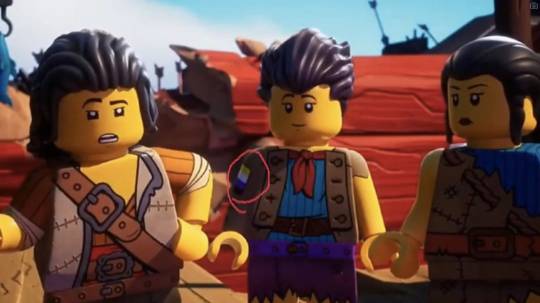
I've been talking about sexual orientation for some time now it's time we talk about gender-queer characters (Gender-Queer is an umbrella label which applies to genders outside the male/female gender binary like non-binary, bigender, pangender, genderfluid, ect.) in Ninjago. One of the Algae Farmers in Dragons Rising have the Non-binary flag attached to them. The person who voices them (Niah Davis) Is also Non-binary. The character didn't have much of a role but it's still super cool to see. (I'm trans so of course I was so happy when I saw it being explicitly showed like this)

The Source Dragon of Life is also non-binary. Which is another character voiced by Niah Davis. The dragon uses they/them pronouns throughout the show and was later confirmed in a tweet. This character actually does play a big role in the series and is the source of Lloyd's power. (Which means Lloyd is non-binary too. /J) They'll also most likely have a big role in season 3 when that comes out. So is every character Niah Davis voices non-binary? Heck yeah!

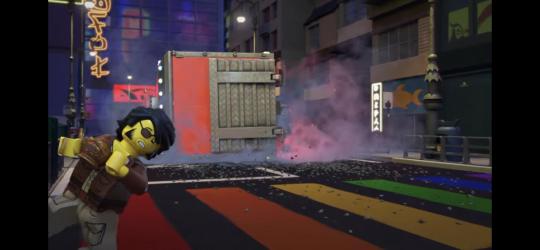
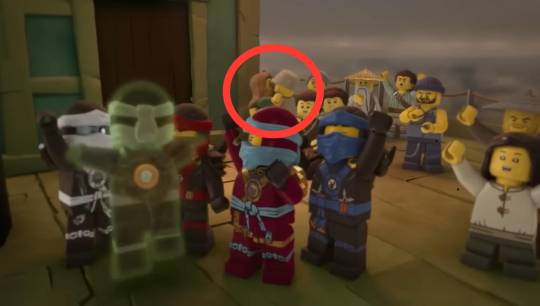
Now these next 3 instances of queerness in Ninjago are very minor but they include 2 instances of 2 male characters kissing and a rainbow sidewalk. Now, some can argue that the sidewalk can be unrelated to the LGBTQ+ community but it was changed to be a white sidewalk in some places in the world, so it was very intentionally to be LGBTQ+. Some may also argue that the 2 male characters kissing can just be a man and a masculine woman but Ninjago very rarely adds masculine woman, so yes, it's like 99.9% 2 men kissing in both instances. Which isn't much but is still showing that Lego isn't afraid to add some gay in the show.
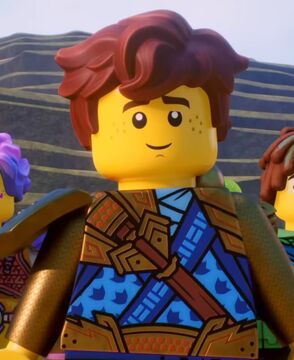
Now I wanna talk about Jay. Before I hear anyone talk about his relationship with Nya hear me out for a bit. Jay is heavily implied to also have an attraction to male characters which leads me to believe that he's probably a bisexual.
First, I want to talk about this clip. Out of context, it looks very much like a marriage proposal and Jay is saying yes with such a smile on his face. Now, it's just a fake marriage proposal and he realizes after and is kinda confused but anyways. What kind of straight man says "Yes! :D" like that to marriage proposal? (Side note: The Ying-Yang promise in Ninjago is not marriage. I'm just calling it marriage because it will make more sense. It's most likely engagement but that's too long to type) I mean, it seems like he really meant it. Which lead me to believe that he's probably a bisexual.
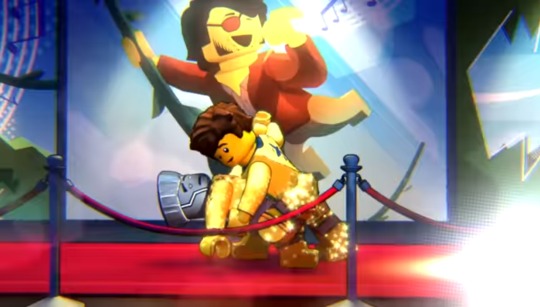
Also the whole Sweating to the Goldies short is very gay. He's very touchy towards Zane and dances with him and stuff. Though song on the end does include both of them but in the beginning it's mostly Jay doing the gay action. He's extremely flirty with Zane and seems to genuinely mean it. Now that's not me trying to say he likes Zane, since he obviously loves Nya, but I think if Nya wasn't an option, he wouldn't mind being with one of his ninja comrades.
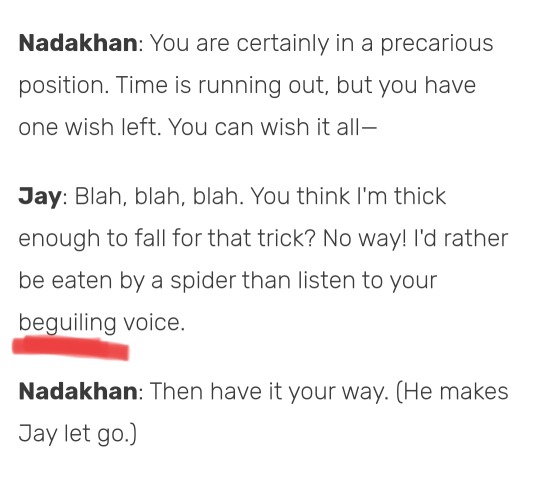
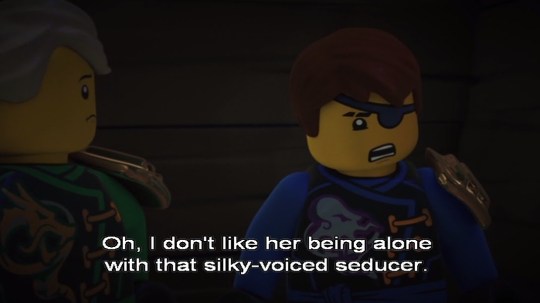
He's also shown to be attracted to Nadakhan's voice. Calling it "beguiling." (Beguiling - Charming or enchanting, often in a deceptive way.) and also calling him a "Silky-voiced seducer." He's also the only ninja in the show to express how attractive his voice is which lead me to believe that he can be attracted to the voice of a male character. Of course, he's not attracted to Nadakhan himself, but acknowledging that he had an attractive voice is no doubt pretty gay. Which is another reason why I believe he's most likely bisexual.
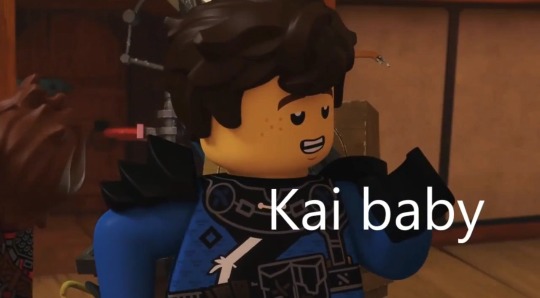
Also another clip related to Kai, he calls him, "Kai baby." Which, c'mon, you don't just call your homies that. That's definitely a sign that he has no problem flirting with other men. Honestly, after season 7, he's been the most gay ninja of the group, despite being one of the only ones having a girlfriend. (Zane was also one of the only ninja to have a girlfriend at the time too but Zane isn't as gay as him) Now if I'm gonna do a little theorizing here, but I think that he's not at peace with his sexual orientation and is now willing to tease and flirt with the other ninja. I know I said I'd keep my headcanons out of this but I'd call it a theory more than a headcanon. (Edit: I, for some reason, can't upload a clip of it so you get a picture of it instead sorry. XD)
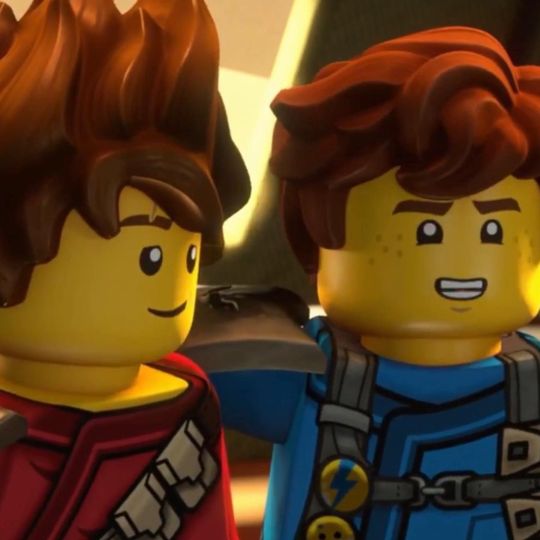
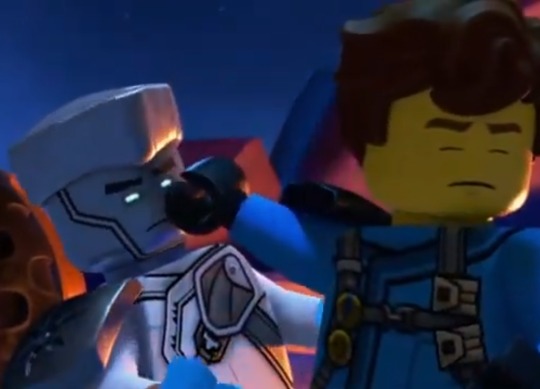
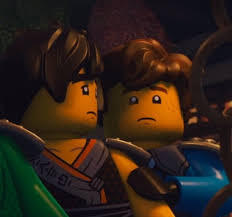
Jay is also just 10 times more touchy than the other ninja. A straight male would normally not be comfortable with this amount of touch from their male friend but Jay doesn't mind. He's pretty chill with it and treats it like it's an everyday thing. Which is very very gay. And sure, they're his friends and they've lived together for basically half of their lives but I've lived with my sister for all of my life and she's not even comfortable with me hugging her without permission (or really anyone) so yeah this kind of touch isn't very straight.

And since we're in the topic of Jay, I want to talk about the most villainous and evil character of Ninjago, FugiDove! He's very touchy towards Jay in the series and even sacrificed himself just to save him. He calls Jay is wingman and wants to be with him a lot. Which is very big implications of FugiDove being gay. And the writers of the show aren't stupid they know what they're doing. So all of these little things are definitely implications of him being gay. Which also applies to Jay and Cole.
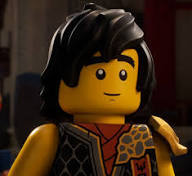
Speaking of Cole, yes, it's finally time we talk about him. All throughout the show Cole doesn't have a love interest. All of the Ninja had one (Jay with Nya, Zane with Pixal, Kai with Skylor) and yet, he hasn't had one. Some may argue that he liked Nya in season 3 but it's confirmed in this tweet that he was just confused by the attention and never really had a crush on her. Some can also claim that he had a crush on Vania but their interactions don't seem very romantic. More like a friendship kind of interaction.
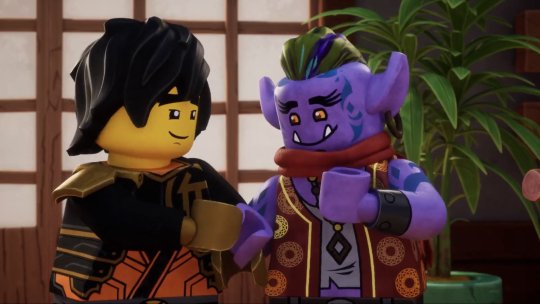
Now, in Dragons Rising we finally see some sort of actual romance with him. He basically raised a whole family with Geo and has a very strong connection with him. They're very close, and you have to remember that Geo is kinda shy and scared to open up to others, and he's pretty vulnerable to Cole. They're also touchy and don't seem to mind it, which leads me to believe that he might some sort of attraction to Geo, a male character. Also Doc Wyatt seems to support a relationship between the 2. So if it became canon, it wouldn't shock me honestly.

Also the episode where Cole finds his true potential is literally an allegory for coming out. I explain it here but I'll explain it again here for the people who are too lazy. Basically the whole episode is him trying his best to hide his identity of a ninja to his father since his father wanted him to be a dancer. Later in his dad find out and is pretty mad at him but after a whole performance and stuff he's accepting of his son and yay they're a happy family. (Watch the episode here I'm bad at explaining.)
Now, if you think about it, it's very much like coming out. He's hiding his identity out of fear that his father won't accept him as his son. He comes out to his father as a ninja and his father is upset about that. Now flip Ninja with the word gay and bam you get the perfect coming out story coming from Lego. I don't think it was intentional but it could very much be as wel. Again, the writers aren't stupid. They know what they're doing. So yeah, I view this episode as an allegory for coming out.
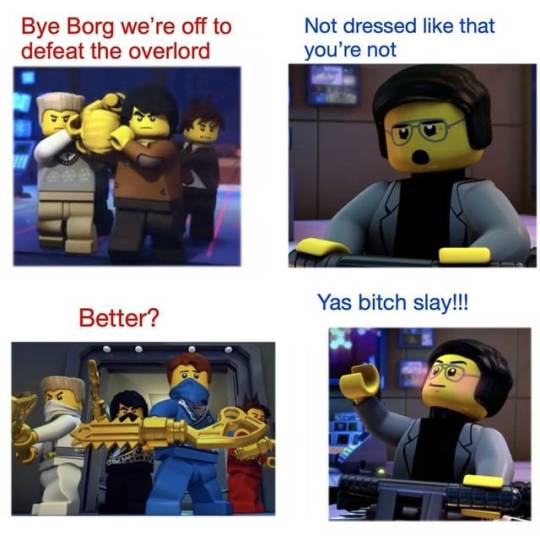
So, yeah, Ninjago is pretty queer. There's a few more examples I wanted to show but then it would be way too long and it's already 11:15PM. Anyways, if you want to sum up everything I'm saying, Ninjago isn't afraid to add some queer representation in the show, Jay is bisexual, and Cole is gay. Or that I'm an overthinker who loves yapping I dunno. And before anyone gets mad, this is going based of the canon. I'd like to think of it as building a headcanon based on canon. You can still have your own headcanons. I honestly don't care. Anyways, if you're still here thank you for staying until the end and reading the thoughts I've had in my head for a while.
#Ninjago#ninjago zane#ninjago cole#ninjago jay#ninjago lloyd#ninjago dragons rising#lego ninjago#Ninjago Kai#Ninjago Nya#jay walker#cole brookstone#kai smith#nya smith#lloyd garmadon#zane julien#ninjago fugidove#Fugidove#ninjago sally#Sally#Ninjago gay#Ninjago queer#Queer#nonbinary#Gay#Bisexual#Lesbian#lgbtq positivity#lgbtq#lgbtq community#lgbtqia
99 notes
·
View notes
Text
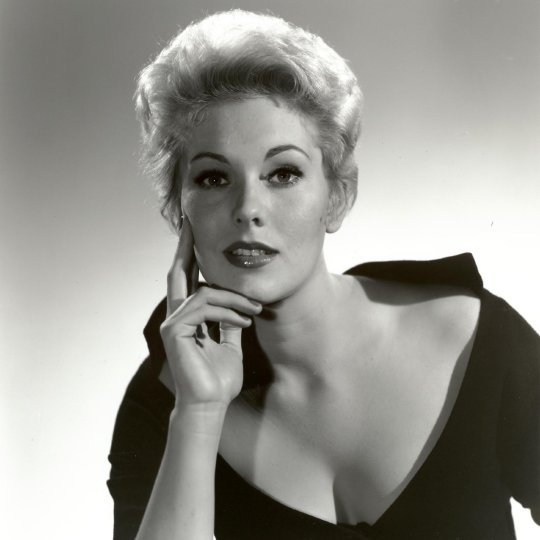
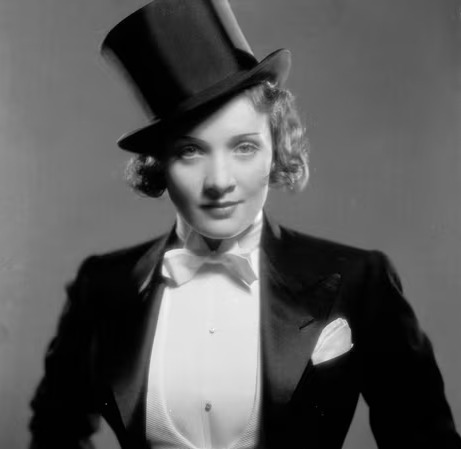
Propaganda
Kim Novak (Vertigo, Bell, Book, and Candle)— She fought as much as she could to be able to preserve her own identity within the crushing hollywood system. She refused to change her czech last name and fought for a higher salary once she discovered her male counterparts were getting payed significantly more, which was an incredibly risky thing to do. She went through so much hollywood bs like she was forced to drop her affair with Sammy Davis jr. She played her iconic role in Vertigo thinking about her own oppressive and significant changes she had to undergo in order to fit in the tight hollywood mold which i think is partly why the movie is so beautiful and timeless. She is a gorgeous soul and a great artist.
Marlene Dietrich (Shanghai Express, Witness for the Prosecution, Morocco)—Bisexual icon, super hot when dressed both masculine and feminine, lived up her life in the queer Berlin scene of the 1920s, central to the 'sewing circle' of the secret sapphic actresses of Old Hollywood, refused lucrative offers by the Nazis and helped Jews and others under persecution to escape Nazi Germany, the love of my life
This is round 4 of the tournament. All other polls in this bracket can be found here. Please reblog with further support of your beloved hot sexy vintage woman.
[additional propaganda submitted under the cut.]
Kim Novak:
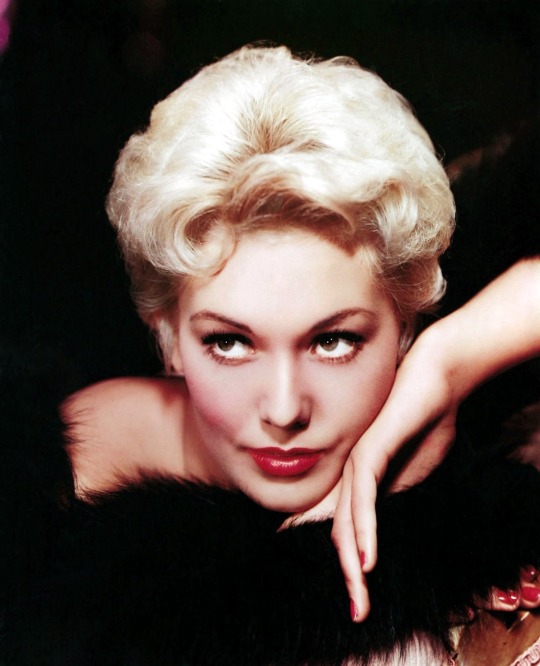
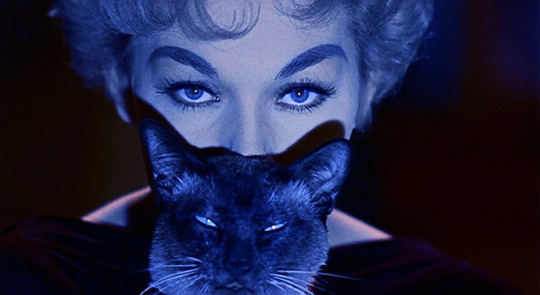
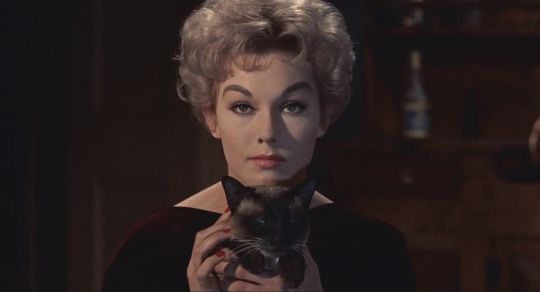
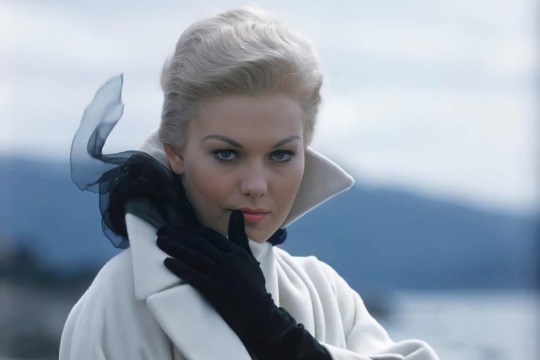
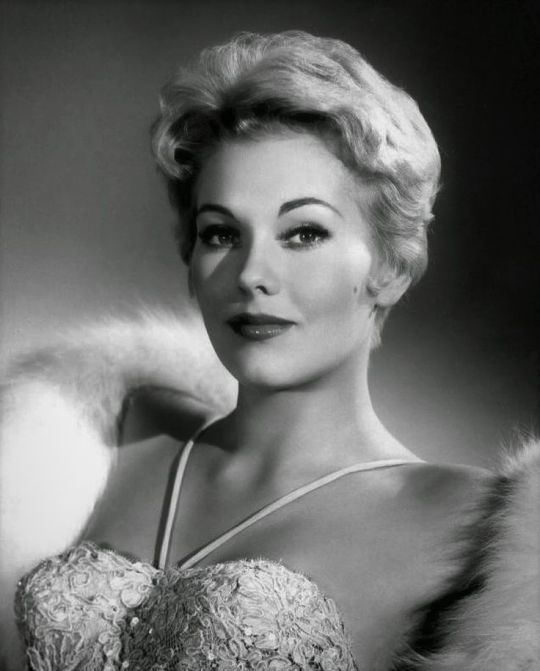
Marlene Dietrich:
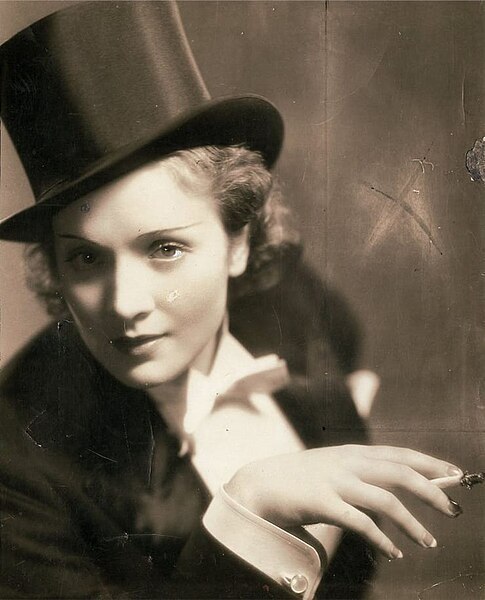
ms dietrich....ms dietrich pls.....sit on my face
its marlene dietrich!!!! queer legend, easily the hottest person to ever wear a tuxedo, that hot hot voice, those glamorous glamorous movies…. most famously she starred in a string of movies directed by josef von sternberg throughout the 1930s, beginning with the blue angel which catapulted her to stardom in the role of the cabaret singer lola lola. known for his exquisite eye for lighting, texture, imagery, von sternberg devoted himself over the course of their collaborations to acquiring exceptional skill at photographing dietrich herself in particular, a worthy direction in which to expend effort im sure we can all agree. she collaborated with many other great directors of the era as well, including rouben mamoulian (song of songs), frank borzage (desire), ernst lubitsch (angel), fritz lang (rancho notorious), and billy wilder (witness for the prosecution). the encyclopedia britannica entry im looking at while compiling this propaganda describes her as having an “aura of sophistication and languid sexuality” which✔️💯. born marie magdalene dietrich, she combined her first and middle names to coin the moniker “marlene”. she was a trendsetter in her incorporation of trousers, suits, and menswear into her wardrobe and her androgynous allure was often remarked upon. critic kenneth tynan wrote, “She has sex, but no particular gender. She has the bearing of a man; the characters she plays love power and wear trousers. Her masculinity appeals to women and her sexuality to men.” in the 1920s she enjoyed the vibrant queer nightlife of weimar berlin, visiting gay bars and drag balls, and in hollywood her love affairs with men and women were an open secret. she was an ardent opponent of nazi germany, refusing lucrative contacts offered her to make films there, raising money with billy wilder to help jews and dissidents escape, and undertaking extensive USO tours to entertain soldiers with an act that included her a playing musical saw and doing a mindreading routine she learned from orson welles. starting in the 50s and continuing into the mid-70s she worked largely as a cabaret artist touring the world to large audiences, employing burt bacharach as her musical arranger.
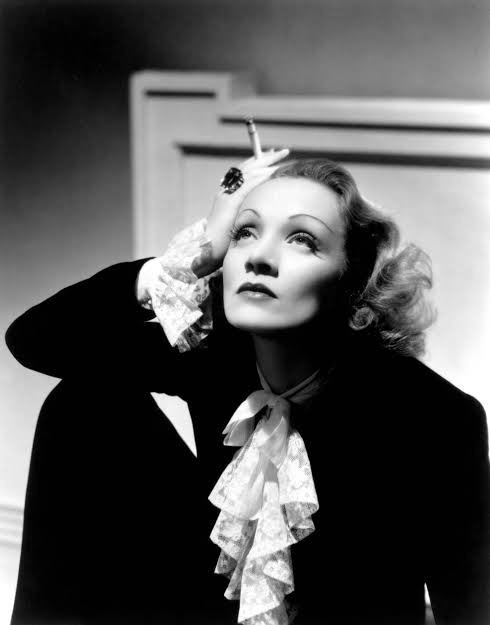
First of all, there are those publicity photos of her in a tux. Second of all, I have never been the same since knowing that she sent copies of those photos to her Berlin lovers signed "Daddy Marlene." Not only is she hot in all circumstances, but she can do everything from earthy to ice queen. Also, she kept getting sexy romantic lead parts in Hollywood after the age of 40, which would be rare even now. She hated Nazis, loved her friends, and had a sapphic social circle in Hollywood. She also had cheekbones that could cut glass and a voice that could melt you.
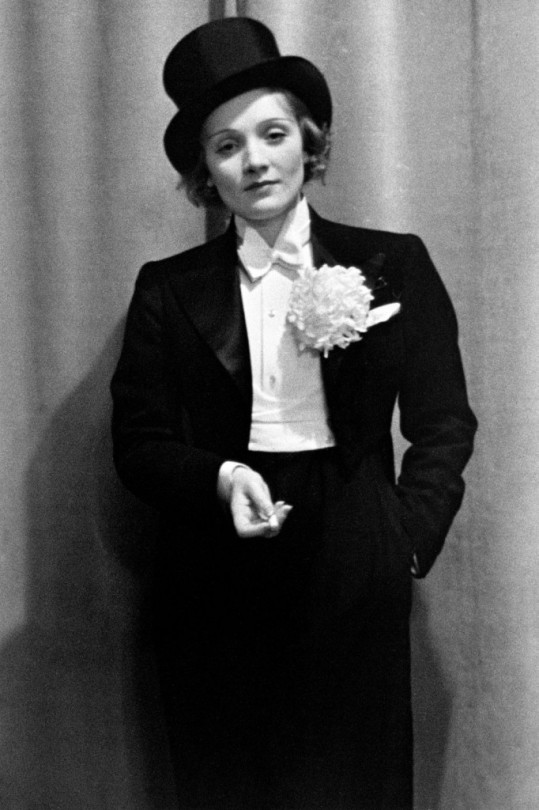
Her GENDER her looks her voice her everything
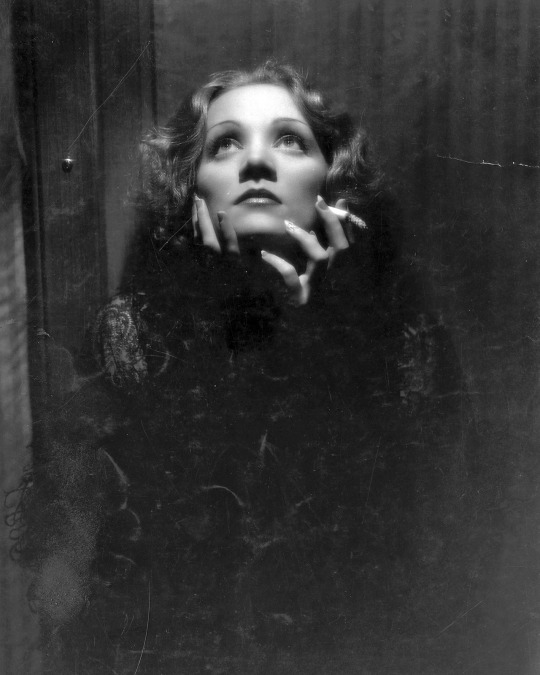
“In her films and record-breaking cabaret performances, Miss Dietrich artfully projected cool sophistication, self-mockery and infinite experience. Her sexuality was audacious, her wit was insolent and her manner was ageless. With a world-weary charm and a diaphanous gown showing off her celebrated legs, she was the quintessential cabaret entertainer of Weimar-era Germany.”
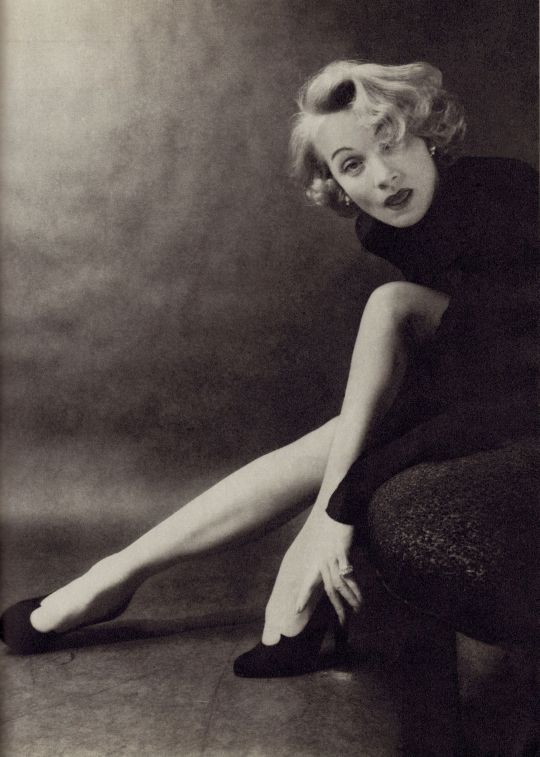
The bar scene in Morocco awoke something in me and ultimately changed my gender
youtube
"Her manner, the critic Kenneth Tynan wrote, was that of ‘a serpentine lasso whereby her voice casually winds itself around our most vulnerable fantasies.’ Her friend Maurice Chevalier said: ‘Dietrich is something that never existed before and may never exist again.’”
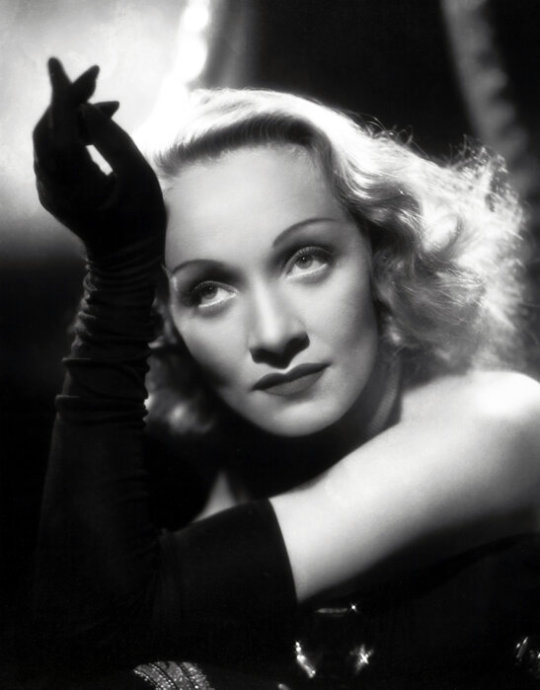
"Songstress, photographer, fashion icon, out bisexual phenom (notoriously stole Lupe Velez and Joan Crawford's men, and Errol Flynn's wife, had a torrid affair with Greta Garbo that ended in a 60-year feud, other notable conquests including Erich Maria Remarque -yes, the guy who wrote All Quiet on the Western Front- Douglas Fairbanks Junior, Claudette Colbert, Mercedes de Acosta, Edith Piaf), anti-Nazi activist. Marlene was a bitch - she had an open marriage for decades and one of her favorite things was making catty commentary about her current lover with her husband, and her relationship with her daughter was painful- but she was also immensely talented, a hard worker, an opponent of fascism and the hottest ice queen in Hollywood for a long time."
youtube
"She can sing! She can act! She told the Nazis to fuck off and became a US citizen out of spite! She worked with other German exiles to create a fund to help Jews and German dissidents escape (she donated an entire movie salary, about $450k, to the cause). She looks REALLY GOOD in a suit. If you're not convinced, please listen to her sing "Lili Marlene". Absolutely gorgeous woman with a gorgeous voice."
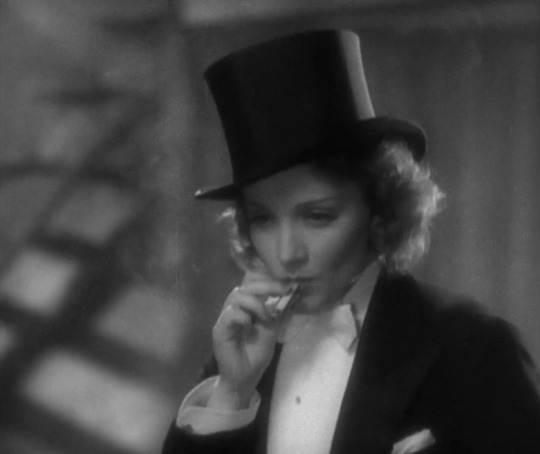
Gifset link
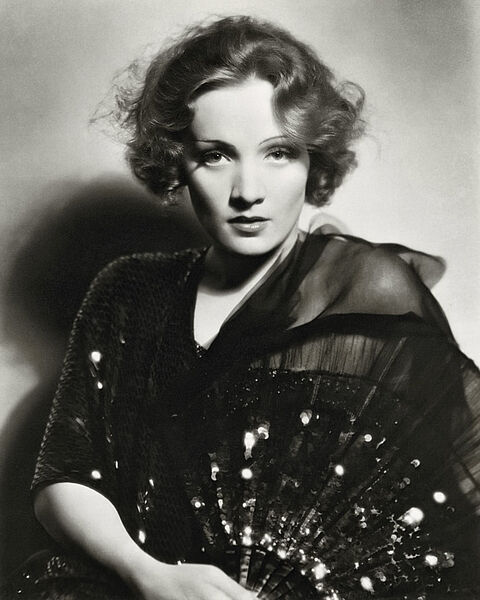
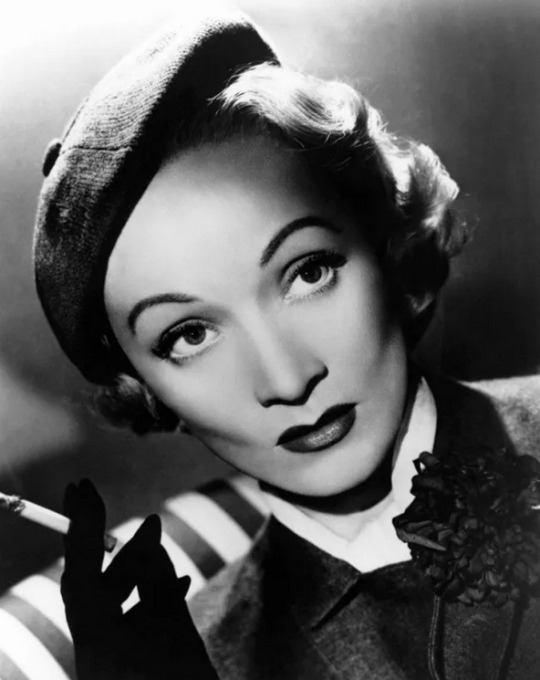
"Bisexual icon and Nazi-hater. Looks absolutely stunning in the suits she liked to wear. 'I dress for the image. Not for myself, not for the public, not for fashion, not for men'."
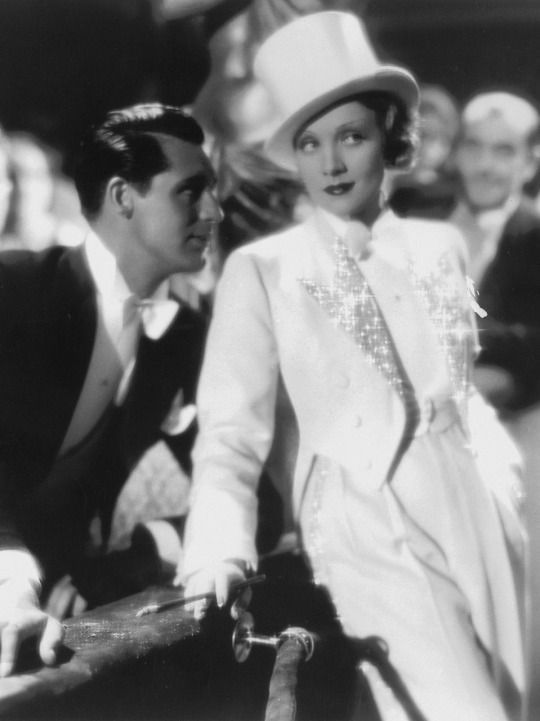
"would you not let her walk on you?"
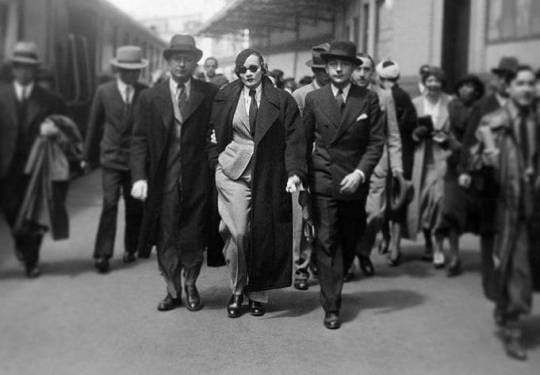
234 notes
·
View notes
Text
Okay! I'm finally putting together some of my more specific Bending the Willow thoughts and this passage:
"Perhaps it was as Jeremy Brett noted: 'Women want to possess him, while men want to be him.' There is certainly some truth in that statement, but the idea is incomplete. I believe male readers not only identify with Holmes, but also experience, in the same way that D. H. Lawrence identified what he referred to as a 'blood consciousness' between men, a kind of spiritual closeness akin to love."
Is making me the kind of insane that makes me want to write like 17 essays. But in absence of the time needed to actually do that here are some of my main thoughts in a more disorganized fashion:
Overall I've noticed a really wild amount of gender essentialism within Sherlockian communities/ scholarship, and I know that a lot of that can be chalked up to the fact that even modern writings are done mostly by older white men, but I also think there's something about the text itself that encourages this. Sherlock Holmes is pretty fucking victorian about gender (Irene Adler occupies a weird space but I do not believe she is in any way exempt from those attitudes.) and I think sometimes scholars find themselves reflecting the values of a text that they do not want to admit is imperfect.
I think this passage pinpoints exactly how a lot of people gender their expectations of how reader are to interact with Sherlock Holmes and texts like it, and Sherlock Holmes in turn becomes kind of weird for women to interact with. For the most part people want to see themselves somewhere in the text, but women in particular are told that we cannot find ourselves within the main character. Some people may be fine with that, lots of people don't want to relate to Holmes and their enjoyment of the text does not come from seeing themselves in that particular character. Some women also genuinely want to relate to the text by fantasizing about being in a relationship with Holmes, and more power to them, but their feeling is not a default, no matter how hard anybody pretends it is.
The fact is that plenty of women do want to be Holmes, and they face an interesting dilemma if they are trying to hold that while still operating under the framework hinted at in this passage. Instead of projecting onto him directly they must find ways to be close to him, be a reflection of him, be him but a girl (without replacing him! don't worry!). I think that's why there's sooo much fiction out there about secret sisters, female apprentices, wit-matching lovers etc. (I myself would pretend to be Sherlock Holmes' secret daughter as a kid. I bought into this shit!)
This framework is also not particularly normal about men who may not see themselves in Holmes at all and who may, in fact, also be capable of fantasizing about having a relationship with him! Queer men exist! (within this passage in fact.) And I know Stuart Davies did not mean to acknowledge this when he wrote of "a kind of spiritual closeness akin to love." but he does put it somewhat homoerotically in a way that left me reeling a little bit.
I do understand the feeling described by Stuart Davies, even if the way he writes of it makes me laugh a little in its dramatics. I simply do not think it is a feeling exclusive to men... I don't think any feelings are exclusive to any gender. And in the end I think that's the idea that really frustrates me.
Of course this passage is also from 1996, it's a product of its time, I get it. I also know that people have had More expansive/critical/interesting ideas about Sherlock Holmes in relation to gender before and since it was written, and I don't think it reflects what everyone really believes. BUT I do think it hit the nail on the head of a phenomena I have noticed since childhood and affirmed that I wasn't imagining things. While also being. Kind of funny.
#this is a little scattered so feel free to ask for clarification! and I've definitely missed some points here!#sherlock holmes#meta#acd canon#bending the willow
60 notes
·
View notes
Note
For a school assignment, I'm assembling an anthology around the theme of queer divinity and desire, but I'm having a hard time finding a fitting essay/article (no access to real academic catalogues :/ ), do you know of any essays around this theme?
below are essays, and then books, on queer theory (in which 'queer' has a different connotation than in regular speech) in the hebrew bible/ancient near east. if there is a particular prophet you want more of, or a particular topic (ištar, or penetration, or appetites), or if you want a pdf of anything, please let me know.
essays: Boer, Roland. “Too Many Dicks at the Writing Desk, or How to Organize a Prophetic Sausage-Fest.” TS 16, no. 1 (2010b): 95–108. Boer, Roland. “Yahweh as Top: A Lost Targum.” In Queer Commentary and the Hebrew Bible, edited by Ken Stone, 75–105. JSOTSup 334. Cleveland, OH: Pilgrim, 2001. Boyarin, Daniel. “Are There Any Jews in ‘The History of Sexuality’?” Journal of the History of Sexuality 5, no. 3 (1995): 333–55. Clines, David J. A. “He-Prophets: Masculinity as a Problem for the Hebrew Prophets and Their Interpreters.” In Sense and Sensitivity: Essays on Reading the Bible in Memory of Robert Carroll, edited by Robert P. Carroll, Alastair G. Hunter, and Philip R. Davies, 311–27. JSOTSup 348. Sheffield: Sheffield Academic Press, 2002. Graybill, Rhiannon. “Yahweh as Maternal Vampire in Second Isaiah: Reading from Violence to Fluid Possibility with Luce Irigaray.” Journal of feminist studies in religion 33, no. 1 (2017): 9–25. Haddox, Susan E. “Engaging Images in the Prophets: Feminist Scholarship on the Book of the Twelve.” In Feminist Interpretation of the Hebrew Bible in Retrospect. 1. Biblical Books, edited by Susanne Scholz, 170–91. RRBS 5. Sheffield: Sheffield Phoenix Press, 2013. Koch, Timothy R. “Cruising as Methodology: Homoeroticism and the Scriptures.” In Queer Commentary and the Hebrew Bible, edited by Ken Stone, 169–80. JSOTSup 334. Cleveland, OH: Pilgrim, 2001. Tigay, Jeffrey. “‘ Heavy of Mouth’ and ‘Heavy of Tongue’: On Moses’ Speech Difficulty.” BASOR, no. 231 (October 1978): 57–67.
books: Ahmed, Sara. Queer Phenomenology: Orientations, Objects, Others. Durham, NC: Duke University Press, 2006. Bauer-Levesque, Angela. Gender in the Book of Jeremiah: A Feminist-Literary Reading. SiBL 5. New York: P. Lang, 1999. Black, Fiona C., and Jennifer L. Koosed, eds. Reading with Feeling : Affect Theory and the Bible. Atlanta, GA: SBL Press, 2019. Brenner, Athalya. The Intercourse of Knowledge: On Gendering Desire and “Sexuality” in the Hebrew Bible. BIS 26. Leiden: Brill, 1997. Camp, Claudia V. Wise, Strange, and Holy: The Strange Woman and the Making of the Bible. JSOTSup 320. Gender, Culture, Theory 9. Sheffield: Sheffield Academic Press, 2000. Chapman, Cynthia R. The Gendered Language of Warfare in the Israelite-Assyrian Encounter. HSM 62. Winona Lake, IN: Eisenbrauns, 2004. Creangă, Ovidiu, ed. Men and Masculinity in the Hebrew Bible and Beyond. BMW 33. Sheffield: Sheffield Phoenix Press, 2010. Eilberg-Schwartz, Howard. God’s Phallus: And Other Problems for Men and Monotheism. Boston: Beacon, 1995. Huber, Lynn R., and Rhiannon Graybill, eds. The Bible, Gender, and Sexuality : Critical Readings. London, UK ; T&T Clark, 2021. Guest, Deryn. When Deborah Met Jael: Lesbian Biblical Hermeneutics. London: SCM, 2005. Graybill, Rhiannon, Meredith Minister, and Beatrice J. W. Lawrence, eds. Rape Culture and Religious Studies : Critical and Pedagogical Engagements. Lanham, Maryland: Lexington Books, 2019. Graybill, Rhiannon. Are We Not Men? : Unstable Masculinity in the Hebrew Prophets. New York, NY: Oxford University Press USA, 2016. Halperin, David J. Seeking Ezekiel: Text and Psychology. University Park: Pennsylvania State University Press, 1993. Jennings, Theodore W. Jacob’s Wound: Homoerotic Narrative in the Literature of Ancient Israel. New York: Continuum, 2005. Macwilliam, Stuart. Queer Theory and the Prophetic Marriage Metaphor in the Hebrew Bible. BibleWorld. Sheffield and Oakville, CT: Equinox, 2011. Maier, Christl. Daughter Zion, Mother Zion: Gender, Space, and the Sacred in Ancient Israel. Minneapolis, MN: Fortress, 2008. Mills, Mary E. Alterity, Pain, and Suffering in Isaiah, Jeremiah, and Ezekiel. LHB/OTS 479. New York: T. & T. Clark, 2007. Stökl, Jonathan, and Corrine L. Carvalho. Prophets Male and Female: Gender and Prophecy in the Hebrew Bible, the Eastern Mediterranean, and the Ancient Near East. AIL 15. Atlanta, GA: SBL, 2013. Stone, Ken. Practicing Safer Texts: Food, Sex and Bible in Queer Perspective. Queering Theology Series. London: T & T Clark International, 2004. Weems, Renita J. Battered Love: Marriage, Sex, and Violence in the Hebrew Prophets. OBT. Minneapolis, MN: Fortress, 1995.
100 notes
·
View notes
Text
Since it's pride month and I'm a lonely queer person I decided to do a quick rundown of my hc for the DigiDestined's identities. This is disregarding the epilogue bc to heck with that let these kids be queer in peace
Now I don't like to discuss the sexuality of young children purely bc they are children and I am an adult and that's weird so I'm basing this on what little knowledge I have of them in Tri alongside what I know from 01. This is them as adults ok? ok here we go
(also um. I'm a dumb millennial that lives in a corn field so uh. If I get something wrong please correct me orz)
Tai: bisexual. As if there was any other answer. Something about him just gives off 'bisexual guy' vibes. Maybe because I think he'd be a total golden retriever boyfriend and those types are usually bi
Sora: non-binary. Her upbringing kind of forced her into being feminine when she really just doesn't want to participate in gender at all
Matt: I'm gonna say pansexual bc to him it literally does not matter. He likes who he likes. Also demisexual and possibly demiromantic. He has to have a strong connection for feelings to develop
Izzy: Ace all day babyyyy. To him, sex is for making babies, but not in a religious way. He isn't sex-repulsed, it's just not a priority
Joe: the cis-hetero ally of the group. You know he's the designated driver to all the Pride events
Mimi: LESBIAN LESBIAN LESBIAN She's a high femme lesbian and she likes other femmes, butches, chapstick lesbians, just WOMEN. and she beats up TERFs bc trans women are women DUH
TK: doesn't wanna put a label on it right now, man, he's into what he's into and he'll figure it out later, my guy. A few months later he realizes he's bi and has to call Matt at 3am bc he's having a crisis, he got an iced latte that day and the male barista smiled at him and now he's having his first Gay Panic
Kari: also bi, the Kamiya family makes bi people like they have a quota to meet. She hooked up with Yolei once and it was fun. Now they listen to Chappell Roan together ❤️
Davis: the hyperactive gay guy of the found family. Falls in love at least once a month. Is terrible at hitting on guys but they always think it's endearing
Yolei: trans girl, lesbian. The others will line up to absolutely obliterate any transphobes that give her problems. She wants an idyllic lesbian romance with absolutely no children
Cody: aro/ace and unbothered by everyone else's romantic life. Don't bring the 'Tai and Matt used to make out all the time in high school' gossip to Cody, he literally does not care lol
Ken: he is gay and hopelessly in love with Davis. He sighs dreamily as Davis tries to do parkour and smacks into the ground like a wad of wet paper
#happy pride month everyone 🌈#digimon adventure#tai kamiya#taichi yagami#sora takenouchi#matt ishida#yamato ishida#izzy izumi#koushiro izumi#joe kido#jyou kido#mimi tachikawa#tk takaishi#takeru takaishi#kari kamiya#hikari yagami#davis motomiya#daisuke motomiya#cody hida#iori hida#yolei inoue#miyako inoue#ken ichijouji#headcanon#for fun
49 notes
·
View notes
Text
Queer Book Recommendations
It's pride season in Wellington, New Zealand and my local library has published its second "Teen Staff Picks" zine! In that spirit, I bring you, a collection of lesser-known queer books featured in the two that have been released so far! I've narrowed the lists down to books that have 1000 or fewer reviews on Goodreads as of posting (though I actually use Storygraph personally). I haven't read most of these, they're new to me as well but looking forward to getting into them.
Sapphic
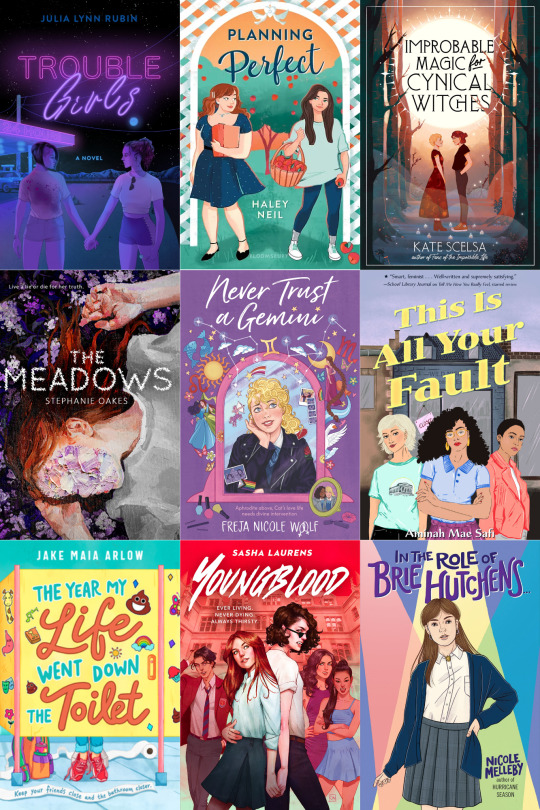
Trouble Girls - Julia Lynn Rubin
Planning Perfect - Haley Neil
Improbable Magic for Cynical Witches - Kate Scelsa
The Meadows - Stephanie Oakes
Never Trust a Gemini - Freja Nicole Woolf
This Is All Your Fault - Aminah Mae Safi
The Year My Life Went Down the Toilet - Jake Maia Arlow
Youngblood - Sasha Laurens
In the Role of Brie Hutchens - Nicole Melleby
Achillean

We Are Totally Normal - Rahul Kanakia
Two Can Play That Game - Leanne Yong
Blaine for the Win - Robbie Couch
I Like Me Better - Robby Weber
The Language of Seabirds - Will Taylor
The Feeling of Falling in Love - Mason Deaver
Charming Young Man - Eliot Schrefer
Emmett - L. C. Rosen
Pages I Never Wrote - Marco Donati
Trans Characters
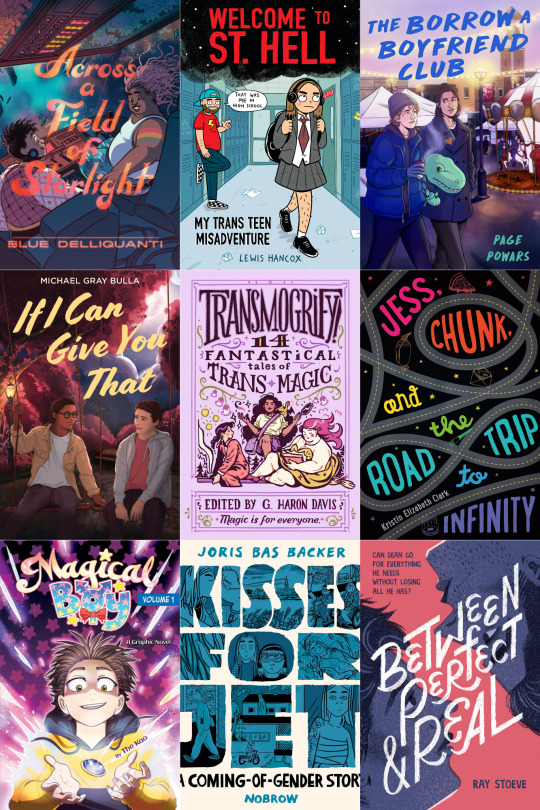
Across a Field of Starlight - Blue Delliquanti
Welcome to St. Hell: My Trans Teen Misadventure - Lewis Hancox
The Borrow a Boyfriend Club - Page Powars
If I Can Give You That - Michael Gray Bulla
Transmogrify!: 14 Fantastical Tales of Trans Magic - G. Haron Davis
Jess, Chunk, and the Road Trip to Infinity - Kristin Elizabeth Clark
Magical Boy - The Kao
Kisses For Jet: A Coming-of-Gender Story - Joris Bas Backer
Between Perfect and Real - Ray Stoeve
Featuring Queer People of Colour

Ander & Santi Were Here - Jonny Garza Villa
The Loophole - Naz Kutub
Spell Bound - F. T. Lukens
Tim Te Maro and the Subterranean Heartsick Blues - H. S. Valley
Rise to the Sun - Leah Johnson
Never Kiss Your Roommate - Philline Harms
Rainbow! - Bloom & Sunny
Other Ever Afters: New Queer Fairy Tales - Melanie Gillman
Anne of Greenville - Mariko Tamaki
#lgbtqia#books#books & libraries#public libraries#queer books#lgbtqiia+#lgbtq+ books#pride#sapphic books#gay books#trans books#bipoc lgbt#wlw#mlm#reading#wellington pride#lgbt#lgbtq#diverse reads#diverse books#graphic novel#fantasy#contemporary romance#romance#coming of age#is this enough tags yet#libraries are important#support your local library#libraries are cool#transgender
58 notes
·
View notes
Photo

Sara Davis Buechner
Gender: Transgender woman
Sexuality: Queer
DOB: Born 1959
Ethnicity: White - American
Occupation: Musician, music teacher, activist
#Sara Davis Buechner#queerness#trans pride#trans femme#lgbt#trans woman#queer#1959#white#musician#teacher#activist#popular#popular post
154 notes
·
View notes
Text
'It should come as no surprise that Russell T Davies, the man behind Queer As Folk, the one who first made Doctor Who tangibly gay, has returned to the franchise with what might be its queerest outing yet. But even we were surprised by quite how integral LGBTQ+ themes would be to the story this time around.
Much has been made of David Tennant and Catherine Tate's return, yet it's Yasmin Finney's brand-new character Rose who's at the heart of this Star Beast special.
Donna's daughter befriends The Meep first, and she's also the one who saves London when The Meep reveals itself to be evil. What's special about this is that it's Rose's trans identity specifically that proves key to her victory.
When we last saw her mother, Donna had absorbed some of the Doctor's energy, creating a 'metacrisis' that would have killed her if the Doctor had not erased her memories. But when she's reminded again of the Time Lord's existence in this latest episode, Donna survives intact, and that's because when she gave birth to Rose, she unknowingly split that energy between them, halving their potentially devastating impact.
As Donna's memories return, Rose's innate Timelord energy is then activated too, enabling her to stop Meep with newfound knowledge and abilities from her position on the ground.
Rose's non-binary identity stems from The Doctor's. (The show finally acknowledges them to be gender-fluid after they presented as both male and female over the course of the franchise). That means the source of Rose's power comes directly from her nature as a non-binary individual, positioning her as a hero because of her gender identity and not despite of it.
That's not to say Doctor Who shies away from the difficulties trans people face in real life. Earlier on in the same episode, bullies deadname Rose in the street and soon after, Donna's own mother, Sylvia, accidentally misgenders Rose as well, despite her good intentions.
Donna's response to all this? "I would burn down the world for you, darling," and honestly, that's how we feel after seeing some of the negative feedback these scenes have received online.
Despite scoring strong reviews from critics and the majority of fans, it seems not everyone is celebrating Doctor Who's much-lauded return.
On Rotten Tomatoes, trolls are review-bombing the episode, bringing the audience score down to 41%, which is a huge contrast from the critics rating of 89%. Of course, everyone is entitled to their own opinion and the episode won't be to everyone's tastes, but when comments suggest the show 'needs to stop pushing talk of pronouns onto kids', it's safe to say most of these opinions are grounded in hate and ignorance.
Imagine being shocked that a show about an alien who regularly changes their body and gender would dare acknowledge such concepts?
In the days following the special, a hashtag named #RIPDoctorWho continued this backlash on X/Twitter, to which Doctor Who casting director Andy Pryor said the following:
"Just stopped by to say that on @bbcdoctor who (or any of our work) we don't work hard to cast inclusively for publicity. We do it because we like stories. & stories should speak to all of us & include all of us. And if one person feels a little less alone, then."
With more queer cast members on the way, including Neil Patrick Harris as the villainous Toymaker and Ncuti Gatwa as the new face of The Doctor himself, the future of Doctor Who is looking queerer by the day.
But it's not just the future that's queer.
To those who baulk at more inclusivity in future seasons, we can't help but wonder: What show have you been watching this whole time? Because Doctor Who is super queer — and it always has been.
Yes, even before Jack Harkness slapped a guy's arse or Bill Potts fell for a puddle named Heather, the Classic era channeled queerness with how it defied the establishment and stood up for those who need it most. It's hard to exaggerate how much stories like this resonated with LGBTQ+ people at a time when positive representation was almost non-existent on screen.
It's no wonder then that a sizeable chunk of Doctor Who's fandom identifies as queer, even if the show wasn't able to address LGBTQ+ fans directly until (queer lifelong fan) Russell T Davies regenerated the franchise in 2005.
But now, all these years later, The Star Beast ushers in a new chapter for Doctor Who where the show can finally live up to the inclusive ethos it's always striven for.
That's not to diminish the positive steps other showrunners have taken in the interim. 2015's 'Sleep No More' featured Doctor Who's first trans actress, Bethany Black, and season twelve's 'Praxeus' successfully flipped the 'Bury Your Gays' trope, although the less said about how season 13 handled #Thasmin the better.
And it's not like everything is suddenly perfect now. Rose's metacrisis abilities could feed into sci-fi tropes around trans/non-binary identities being considered "alien", plus the inclusion of Rose's deadname has garnered a mixed response from the trans community online.
While some argue this has given trolls the opportunity to use that name venomously against her character, others point out that transphobia is a reality the show shouldn't shy away from.
The moment when Rose calls the Doctor out for assuming Meep's pronouns might feel a bit-on-the-nose for some too, although if this kind of talk immediately heralds the end of the franchise for you, you might want to cast your mind back a few decades to 1972's 'The Curse of Peladon' where the Doctor and Jo discussed Alpha Centauri's pronouns at length.
But still, seeing trans and non-binary identities celebrated to this degree is very much welcome regardless, especially in a family show with such a huge fanbase like Doctor Who. This is the kind of storytelling that saves lives, trolls be damned.
And now, with the impending arrival of more trans actors and characters in Yasmin Finney's wake — including Jinkx Monsoon, Mary Malone and Pete MacHale — Doctor Who's next season promises to be more inclusive than ever before.
If you have a problem with that, remember that your hero, the good Doctor, would never discriminate against trans people, or any other marginalised group for that matter either. So why would you?'
#Doctor Who#The Star Beast#60th Anniversary#Catherine Tate#Donna Noble#Yasmin Finney#Rose Noble#David Tennant#Neil Patrick Harris#Russell T. Davies#Queer As Folk#The Curse of Peladon#Jinkx Monsoon#Mary Malone#Pete MacHale#The Toymaker#Ncuti Gatwa#Bethany Black#Sleep No More#Praxeus
86 notes
·
View notes
Text
By: Lisa Selin Davis
Published: Jul 5, 2023
“Have you seen the latest study?” the psychologist asked me.
I had called Dr. Ken Zucker, a man who had spent decades working with children and young people with gender dysphoria, to talk to him about the history of that diagnosis. I wanted to know who got to decide when something was a variation versus a deviation; who got to decide when a way of being gendered in the world was abnormal, and required treatment.
By this time, I’d been writing about gender issues full time for about four years, since I published an op-ed in The New York Times about people assuming my masculine daughter was transgender and required social transition. Why, I asked, would we create so much meaning from a child rejecting the gender role associated with her sex? Isn’t that what GenX kids like me, reared with the soundtrack of Free to Be, You and Me, were raised to do?
The op-ed was supported by many, but vociferously objected to by some who accused me of transphobia. I was shocked and stung by that reaction. In the piece I said that I supported trans kids, but wanted to encourage children to explore both sides of the pink/blue divide without it reflecting on their identities—how could that be hateful? I reached out to some of my detractors to ask them to explain their views to me, and perhaps because I put in the subject line “What I got wrong,” some of them—including very prominent trans activists—agreed to do so.
I won’t name him, but one person who’d written a response to my piece, which had also gone viral, was a lawyer for an influential non-profit law group. He spent an hour-and-a-half at a coffee shop in the Financial District explaining to me that nuanced arguments like mine were dangerous. Deviating from the script, he said, always provided fodder for the right wing that wanted to oppress trans people and take away their rights and healthcare. Indeed, to my shock, Breitbart had written about my piece as an example of “slamming transgender ideology.” And Laura Ingraham’s people had reached out to me to appear on her show, even though I was clearly a full-throttle liberal. This confused and frightened me. I didn’t want to play for the other team.
Others reached out to me, too, including a healthcare lawyer, and lesbian, who lived in my neighborhood. We met for coffee, and she explained the issue from her point of view: pharmaceutical companies were conducting experiments on gay kids. Though it sounded too wild to be true, ringing of conspiracy theory, her idea dislodged some doubt inside me. Two years before, a friend of mine had made a documentary about trans kids. I’d said to her at the time, “Why do they all seem gay?”
I powered through my doubts, writing a book about gender nonconforming girls, trying to represent diverse points of view in the project. Well, some diverse points of view. My friend who’d written a book about trans teens five years before told me that I should never mention detransitioners; I’m sad to say I took this advice to heart. It was too dangerous for trans people, she said, and I didn’t want to make life any worse for people struggling to be understood and accepted.
Still, I questioned why so many of the people identifying as trans seemed to be rooting their identities in stereotypes. I was nuanced, but not in a way that could excite Tucker Carlson. I knew, like so many people, that something was wrong with the increasingly pervasive narrative about trans kids. I just didn’t have the knowledge and the language to articulate it. (This is something many people identifying as trans also say: they had a feeling. They didn’t have information, or a name.)
Then, almost a year after my book was published, I called Dr. Zucker. He showed me the study, and it was then I knew I’d allowed myself to be captured. The study followed young boys with gender dysphoria over a 15-year period. Almost 90 percent of boys desisted during or after puberty—that is, their gender dysphoria subsided. And almost 70 percent of them were bisexual or gay. Left alone, and not socially transitioned, almost all young kids now labeled as trans would not grow up to identify that way, and most would be same-sex attracted. The only time the media mentions this and the other studies with similar results is to discount them. Kids are routinely taught that gender and sexuality are not connected, but in fact, they are deeply intertwined.
From that moment of awakening, I allowed myself to look at the mountains of disruptive evidence that I had blinded myself to in years before. Once I saw it, I couldn’t look away. The mainstream media narrative about conversion therapy, detransitioners, puberty blockers, trans kids—it’s all deeply distorted and leaves out information that every person—especially every gender dysphoric kid and parent of one—deserves to know.
One reason so many gay and lesbian adults are concerned about the medical treatment of gender dysphoric youth is that they experienced that condition as children. Like so many, they grew out of it, and later identified as gay. There is overlap between childhood GD, and childhood gender nonconformity, and later homosexuality; thus they see these medical interventions as a kind of conversion therapy. The media and medical community’s refusal to acknowledge that has left a generation misinformed. The left wing, and especially the left and center press, have gotten this story very, very wrong.
Perhaps the most shocking thing I learned is that the medical protocol used to “liberate” trans kids is the same protocol once used to treat or cure homosexuality, and still used to chemically castrate sex offenders. What if every brochure, every children’s hospital gender clinic website, every activist organization, led with that fact? Would more of us wake up, and faster? Would more of us covert to be on the side of evidence, truth, and nuance, rather than thought-terminating clichés?
Let’s find out, shall we? Let’s inform people on the left properly, and see if we can push past the culture war to do what’s best for kids.
==
More successful at "fixing" gay kids than the Xian Right ever was.
#Lisa Selin Davis#gender ideology#queer theory#stereotypes#gender stereotypes#gay conversion#gay conversion therapy#woke homophobia#anti gay#gender nonconforming#gender noncomformity#gender dysphoria
54 notes
·
View notes
Note
Hello, I'm the anon who asked about reading recs! I did respond back right away, but since you just asked for asks, I get the feeling Tumblr ate my ass 😄. In case it did, here it is again:
I'm trying to get my footing into witchcraft in general. I'd really like to start practicing, especially anything nature related, but I truly know nothing more than what you'd get scrolling through the tumblr tag. So I'm supposed I'm looking for a good starting place to learn my history around the practice (I know "the practice" is an incredibly broad way to describe it. But I don't know enough to be specific. I suppose anything that could give me a foundation to build from?) and something(s) that could help me dip my toes in for the first time. I've been watching everyone else swim in the pool for years, but I've never even touched the waters.
To simply put it, I'm trying to figure out the very beginning steps of witchery. I know I described everything broad and vague, but I don't really know enough to be more specific 😅
(if Tumblr didn't eat my ask and you haven't responded to my ask for any other reasons, no worries! I'm certainly in no rush)
Omg hello! No tumblr didn't eat you but I was waiting on some responses from friends who I asked for reading recs and my draft box DID eat your ask lol. Thank you for following up with my ADHD-addled ass!! <3
The good news is to start you just kinda jump in. I'm not saying throw yourself into the deep in but you can get your feet wet pretty easily.
Unfortunately during my beginner years most of the published books available were heavily soaked in Wiccan ideology which is absolutely not my vibe and not something I think people should start out with since there's a twisted history to it that you have to unwind but I see why people are attracted to it--it's structured in a way that solitary practice isn't.
I found my start online, honestly, then followed my gut to see where it took me next. All that said;
Here are some recs from me and my buddies:
Magic in the Middle Ages by Richard Kieckhefer (History)
Cunning Folk and Familiar Spirits by Emma Wilby (History)
Popular Magic by Owen Davies (History)
Grimoires: A history of magic books by Owen Davies (History)
Curse Tablets and Binding Spells from the Ancient World by John G. Gager (History)
The Crooked Path by Kelden (Traditional Witchcraft)
13 pathways by Daniel Schulke (Occult Herbalism)
A Deed Without a Name by Lee Morgan (Witchcraft)
Of Witchcraft and Whimsy by Rose Orriculum (Witchcraft)
Grovedaughter Witchery by Bree NicGarran (Witchcraft)
Queering Your Craft by Cassandra Snow* (Witchcraft + queer)
Condensed Chaos by Phil Hine* (Chaos magic)
Outside the Charmed Circle by Misha Magdalene* (Witchcraft)
Sacred Gender by Ariana Serpentine (Witchcraft + queer)
Kitchen Table Magic by Melissa Cynova* (Witchcraft)
*Queering Your Craft and Kitchen Table Magic are that they both feel more basic, Condensed Chaos is more of a "102" type book for chaos magic specifically, and Outside the Charmed Circle is strongly Wiccan in influence but brings up some very interesting topics and ideas. (Note from Jasper)
Make sure to keep an open mind and take no one's word as law when it comes to witchcraft and magic. Take in the information and come up with your own conclusions based on your experiences! :>
Thanks to @windvexer , @stagkingswife, @jasper-pagan-witch, and @rose-colored-tarot for help with the recommendations!
Feel free to comment or reblog with your own suggestions!
46 notes
·
View notes